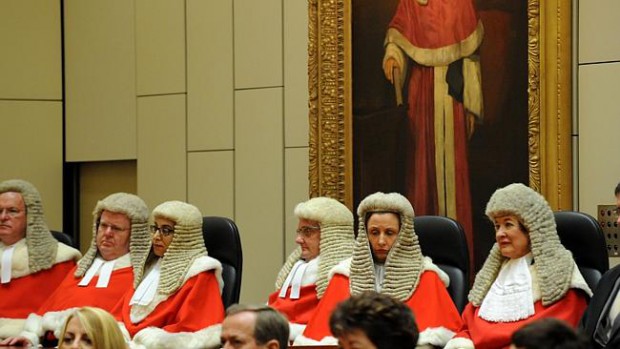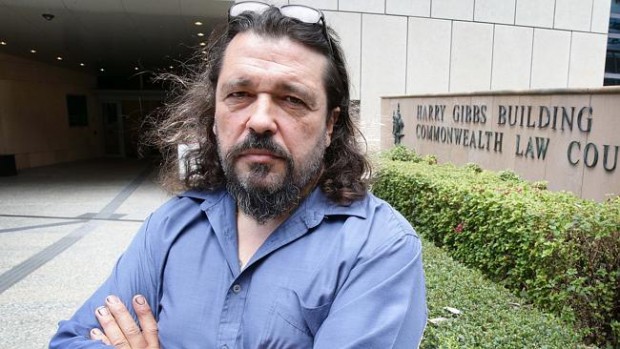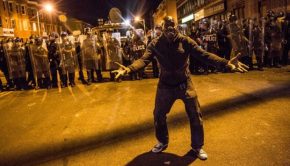VLAD, THE HIGH COURT & WHY ALL IS NOT YET LOST
Some wins are real wins, like coming first place in a race or picking the lucky ticket from a hat. Other wins, like that lauded by the Queensland Government when a handful of Attorney-General Jarrod Bleijie’s suite of draconian laws were upheld in the High Court, are disguised and promoted as a win, when in fact it is nothing of the sort.
Unlike other kinds of successes, when a law is upheld in the High Court, it is not necessarily the final decision that is important, but the reasoning behind the final decision. And in this respect, Jarrod Bleijie has received the closest to a judicial slap in the face as the High Court Justices were capable of delivering given the constraints of Australia’s legal system.

“Why is there a conveyancer pretending to write laws?”
Careful reading of the High Court judgment by eminently qualified lawyers reveals a number of realities that Jarrod Bleijie would prefer kept quiet.
The reasoning behind the High Court decision paints a very different picture to that which Bleijie and his supporters portrayed to the media. The decision has serious implications for the application and practicalities of his laws.
The High Court decision has made it really quite difficult for the State of Queensland to successfully prosecute a person under any of the laws which rely on the Attorney-General’s arbitrary declared list of so-called criminal organisations. This includes the ban on three or more participants in a criminal organisation being knowingly present in a public place, participants entering prescribed places or events, recruiting persons to become participants, and the wearing of prohibited items on licensed premises.
Despite the laws remaining for now, the triumphant smile must surely be wiped from Bleijie’s face. His plan to override the judiciary has been thwarted.

“Oh, I need to sit over there? At the kids’ table? Sorry.”
Since the legislation passed the Queensland parliament with no consultation or scrutiny, Bleijie has protested vehemently that only serious organised criminals need fear his laws.
Bleijie has repeatedly assured good, law-abiding people that only those allegedly criminal bikies, engaged in vicious, fear-inducing acts of violence, drug-trafficking, prostitution or wickedly riding their motorcycles in a way as to strike terror into the hearts of the innocent, had anything to worry about.
And in conjunction with Police Minister Jack Dempsey and the Queensland Police Service, Bleijie has made certain that all Australians understood his self-imposed distinction between upstanding citizens, and members and associates of one-percent clubs by relabelling Outlaw Motorcycle Clubs (OMCs) as Criminal Motorcycle Gangs.
This crucial distinction between bikies and their friends, and other motorcyclists and members of the community has been Blejie’s constant reiteration to allay concerns about him quashing the rule of law.
The laws were justified, proclaimed Bleijie, because only the real baddies were subject to them. And both Newman and Bleijie inferred that those who were against the laws must have been criminal sympathisers, if not part of the criminal gang machine.
And so the High Court has held the Attorney-General to his word.
The decision is based on the reasoning that the correct interpretation of the laws means it only applies to those associations and its participants actually involved in, or intending to engage in serious criminal activity.
By this, the High Court means provable involvement, intention and serious crime. Petty or regulatory offences, such as selling liquor without a licence are irrelevant.
And in a glorious twist, the High Court has determined that actual evidence is required; admissible, lawfully obtained evidence that does not include rumour, second hand information or confessions induced under threat or promise. The subjective declarations from the Attorney-General that the one-percent clubs are criminal organisations, is not sufficient as proof. The normal rules of evidence apply. And proof beyond reasonable doubt must be provided by the State in relation to each club and each participant, for each offence.
This is a massive blow to Bleijie, who earlier in the year declared that the evidence on which he made his declarations would remain forever hidden.

Mick Kosenko from the Rebels MC has been instrumental and unyielding in his fight against the insanity of the Queensland government’s unjust laws.
Bleije’s self-appointed powers have been considerably weakened.
No doubt Bleijie will remind everyone that he always said only the most serious of criminals had anything to worry about and the laws would not be used on the law-abiding. However it was clearly his intention to imprison any person who had anything whatsoever to do with any bikie club. He did not hide his desire to eradicate every one-percent club member and associate in Queensland and deter those from other states visiting.
This is well demonstrated by the absurdity of the arrests to date, including a female librarian with no criminal record being charged for having lunch with her alleged bikie boyfriend and a mate, and a group of childhood friends buying ice-cream on holiday.
While people can still be arrested under the laws, jailing anyone has just become a whole lot harder for Bleijie.
And given the majority of the members of declared clubs have no convictions for serious crimes, if any at all, the State might be hard pressed to prove the clubs are criminal organisations. If admissible evidence existed, one would expect the police to have acted on it and charged those responsible under established laws already.
While Bleijie can certainly still declare any group he chooses to be a criminal organisation, unless the State can prove it in a court of law, the declaration is worthless.
Bleije’s attempts to demonstrate his toughness in fighting crime have backfired on him quite spectacularly. His plans to override the courts and simply declare any group he chooses to be a criminal organisation have been tempered. And rather than accept the argument that the government had tried to tell the judiciary what to do, the High Court have simply acted on the presumption that all normal rules apply. This is a huge slap-down to Bleijie who has demonstrated on more than one occasion his contempt and disregard for the fundamental principles of law which he preferred did not apply in Queensland.
The Newman Government’s posturing, propaganda and harsh law and order agenda is backed by a set of laws, that when interpreted as prescribed by the High Court, become very difficult to act upon. The High Court ruling has the effect of turning Bleijie’s tough, strong legislation into nothing.
The High Court decision was not a win for Jarrod Bleijie. The Court has not validated his ability to act as judge, jury and executioner. It has held Bleijie and the Newman Government to account, albeit not in the desired way.
Enacting unworkable, bizarre and draconian laws is not something to be proud of, even if those laws are found to be valid. Bleijie should not be trumpeting the decision as win of any sort. Instead he has provided the perfect example to other Attorney-Generals of what not to do, if they intend to maintain even a hint of credibility.
Bleijie’s victory is short-lived. And with an election just around the corner, his reign as Attorney-General will be too.
Now that will be a win.









